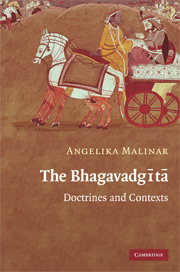Book contents
- Frontmatter
- Contents
- Acknowledgements
- List of abbreviations
- Introduction
- 1 The Bhagavadgītā in the history of research
- 2 Debates over war and peace in the Udyogaparvan of the Mahābhārata
- 3 The doctrines of the Bhagavadgītā
- 4 The doctrines of the Bhagavadgītā: summary and systematic considerations
- 5 Historical and cultural contexts
- Bibliography
- Index
4 - The doctrines of the Bhagavadgītā: summary and systematic considerations
Published online by Cambridge University Press: 06 January 2010
- Frontmatter
- Contents
- Acknowledgements
- List of abbreviations
- Introduction
- 1 The Bhagavadgītā in the history of research
- 2 Debates over war and peace in the Udyogaparvan of the Mahābhārata
- 3 The doctrines of the Bhagavadgītā
- 4 The doctrines of the Bhagavadgītā: summary and systematic considerations
- 5 Historical and cultural contexts
- Bibliography
- Index
Summary
The main features of the arguments and doctrines explored in the analysis of the BhG will now be summarised thematically to provide a basis for a consideration of the possible cultural-historical contexts of the text. The text will be treated ‘holistically’, though departing from the text-historical assumption that the monotheistic framework marks the completion of the argument. In the extant text, the revelation of Kṛṣṇa's divinity and the doctrine of bhakti are treated as the solution to Arjuna's dilemma. The previous analysis showed that the BhG presents doctrines and ideas, most prominently the concept of disinterested action and the revelation of Kṛṣṇa as the highest god and yogin, that are connected intrinsically not only with Vedic and Upaniṣadic traditions or notions of yoga and Sāṃkhya, but also with epic debates on kingship and the use of power. The theology of the BhG gains additional layers of meaning when considered in the context of these political debates. It addresses these debates when Arjuna is depicted as the ‘ideal king’ and turned into a devoted follower of the highest god, who is proclaimed and worshipped as the true sovereign of the cosmos. The religious dimension of bhakti is not separated from the political (that is, socio-cosmic) aspects that are indicated when drawing on the symbols and discourse of kingship. Equally important is the interpersonal character of bhakti as a relationship based on mutual affection and a sense of belonging.
- Type
- Chapter
- Information
- The BhagavadgitaDoctrines and Contexts, pp. 226 - 241Publisher: Cambridge University PressPrint publication year: 2007



